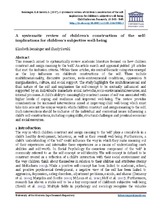A systematic review of children’s construction of the self: implications for children’s subjective well-being
Abstract
This research aimed to systematically review academic literature focused on how children construct and assign meaning to the ‘self.’ An article search and appraisal yielded 38 articles that met the inclusion criteria. Within these articles, six central thematic categories emerged as the key influences on children’s constructions of the self. These include multidimensionality, discursive practices, socio-environmental conditions, oppression & marginalisation, culture, and social support. The study highlights the multidimensional and fluid nature of the self and emphasises the self-concept to be mutually influenced and supported by an individual’s immediate social networks, socio-environmental resources, and internal processes. A child’s ability to meaningfully construct a sense of self was associated with higher levels of coping and resilience and improved well-being. The review provides considerations for increased interventions aimed at improving child well-being which must take into account the unique ways in which children construct and assign meaning to the self. Such interventions should be inclusive of the individual and contextual issues influencing a child’s self-constructions, including coping skills, structural challenges and proximal economic and social resources.

